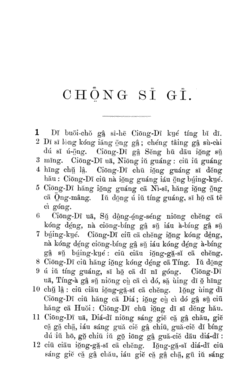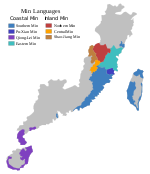Jian'ou dialect
| Jian'ou | |
|---|---|
Gṳ̿ing-é-dī / 建甌事 | |
| Pronunciation | [kuiŋ˧˧ ɪ˥˦ ti˦˦] |
| Native to | Southern China |
| Region | Jian'ou, Fujian province |
Language family | Sino-Tibetan
|
Writing system | Chinese character, Kienning Colloquial Romanized |
| Language codes | |
| ISO 639-3 | – |
| Glottolog | jian1240[1] |

Bible in Jian'ou Romanised (Genesis), published by the British and Foreign Bible Society.
Jian'ou dialect (Northern Min: Gṳ̿ing-é-dī / 建甌事; Chinese: simplified Chinese: 建瓯话; traditional Chinese: 建甌話; pinyin: Jiàn'ōu huà), also known as Kienow dialect, is a local dialect of Northern Min Chinese spoken in Jian'ou in the north of the Fujian province. It is regarded as the standard common language in Jian'ou.
Contents
1 Phonetics and Phonology
1.1 Initials
1.2 Rimes
1.3 Tones
2 Footnotes
3 References
4 External links
Phonetics and Phonology
According to The Eight Tones of Kien-chou (建州八音), a rime dictionary which published in 1795, Jian'ou dialect has 15 initials, 34 rimes and 7 tones in the 18th century, however there are only 6 tones in the modern dialect as the "light level" (陽平) tone disappeared.
Initials
| | Bilabial | Alveolar | Velar | Glottal | |
|---|---|---|---|---|---|
Nasal | m | n | ŋ | | |
Plosive | voiceless unaspirated | p | t | k | ʔ |
voiceless aspirated | pʰ | tʰ | kʰ | | |
Affricate | voiceless unaspirated | | ts | | |
voiceless aspirated | | tsʰ | | | |
Fricative | | s | x | | |
Approximant | | l | | | |
Rimes
| Open syllable | Nasal coda | |||||||||||||||
|---|---|---|---|---|---|---|---|---|---|---|---|---|---|---|---|---|
Open mouth | a | ɪ | ɛ | œ | ʊ | ɔ | ai | au | aŋ | aiŋ | eiŋ | œyŋ | ɔŋ [2] | |||
Even mouth | i | ia | iɛ | iɔ | iau | iu | iŋ | iaŋ | ieiŋ[3] | iɔŋ | ||||||
Closed mouth | u | ua | uɛ [4] | uai | uiŋ [5] | uaŋ | uaiŋ | uɔŋ | ||||||||
Round mouth | y | yɛ [4] | yiŋ [5] | |||||||||||||
Tones
Jian'ou has four tones, which are reduced to two in checked syllables.
| Tone number | Tone name | Tone contour |
|---|---|---|
| 1 | level (平聲) | ˥˦ (54) or ˥ (5) |
| 2 | rising (上聲) | ˨˩ (21) or ˩ (1) |
| 3 | dark departing (陰去) | ˨ (2) |
| 4 | light departing (陽去) | ˦ (4) |
| 5 | dark entering (陰入) | ˨˦ (24) |
| 6 | light entering (陽入) | ˦˨ (42) |
The entering tones in Jian'ou dialect do not have any entering tone coda (入聲韻尾) such as /-ʔ/, /-p̚/, /-t̚/ and /-k̚/ which makes it distinct from many other Chinese varieties.
Footnotes
^ Hammarström, Harald; Forkel, Robert; Haspelmath, Martin, eds. (2017). "Jian'ou". Glottolog 3.0. Jena, Germany: Max Planck Institute for the Science of Human History..mw-parser-output cite.citation{font-style:inherit}.mw-parser-output q{quotes:"""""""'""'"}.mw-parser-output code.cs1-code{color:inherit;background:inherit;border:inherit;padding:inherit}.mw-parser-output .cs1-lock-free a{background:url("//upload.wikimedia.org/wikipedia/commons/thumb/6/65/Lock-green.svg/9px-Lock-green.svg.png")no-repeat;background-position:right .1em center}.mw-parser-output .cs1-lock-limited a,.mw-parser-output .cs1-lock-registration a{background:url("//upload.wikimedia.org/wikipedia/commons/thumb/d/d6/Lock-gray-alt-2.svg/9px-Lock-gray-alt-2.svg.png")no-repeat;background-position:right .1em center}.mw-parser-output .cs1-lock-subscription a{background:url("//upload.wikimedia.org/wikipedia/commons/thumb/a/aa/Lock-red-alt-2.svg/9px-Lock-red-alt-2.svg.png")no-repeat;background-position:right .1em center}.mw-parser-output .cs1-subscription,.mw-parser-output .cs1-registration{color:#555}.mw-parser-output .cs1-subscription span,.mw-parser-output .cs1-registration span{border-bottom:1px dotted;cursor:help}.mw-parser-output .cs1-hidden-error{display:none;font-size:100%}.mw-parser-output .cs1-visible-error{font-size:100%}.mw-parser-output .cs1-subscription,.mw-parser-output .cs1-registration,.mw-parser-output .cs1-format{font-size:95%}.mw-parser-output .cs1-kern-left,.mw-parser-output .cs1-kern-wl-left{padding-left:0.2em}.mw-parser-output .cs1-kern-right,.mw-parser-output .cs1-kern-wl-right{padding-right:0.2em}
^ /oŋ/ which is mentioned in Kienning Colloquial Romanized has merged into /ɔŋ/ in the modern dialect.
^ /ieiŋ/ is not mentioned in Kienning Colloquial Romanized as it diverged from /iŋ/ after the romanization system was established.
^ ab /yɛ/ tends to merge into /uɛ/.
^ ab /yiŋ/ tends to merge into /uiŋ/.
References
- Běijīng dàxué zhōngguóyǔyánwénxuéxì yǔyánxué jiàoyánshì. (1989) Hànyǔ fāngyīn zìhuì. Běijīng: Wénzìgǎigé chūbǎnshè.(北京大學中國語言文學系語言學教研室. 1989. 漢語方音字匯. 北京: 文字改革出版社)
Norman, Jerry. [1988] (2002). Chinese. Cambridge, England: CUP
ISBN 0-521-29653-6
- Yuán, jiāhuá (1989). Hànyǔ fāngyán gàiyào (An introduction to Chinese dialects). Beijing, China: Wénzì gǎigé chūbǎnshè. (袁家驊. 1989. 漢語方言概要. 北京:文字改革出版社.)
Compilation Commission of Chorography of Jian'ou County 建瓯县地方志编纂委员会 (1994). Jian ou xian zhi 建瓯县志 ["Chorography of Jian'ou County"]. 36. Beijing: Zhonghua Book Company. ISBN 7-101-01283-3.
External links
Lien, Chinfa (1990). "Competing final systems in the Jian'ou dialect" (PDF). Tsing Hua Journal of Chinese Studies. 20 (1): 1–53.
Cantonese and other dialects (in Chinese)- Classification of Northern Min Dialects from Glossika
- Jian'ou Romanized Vernacular Bible
